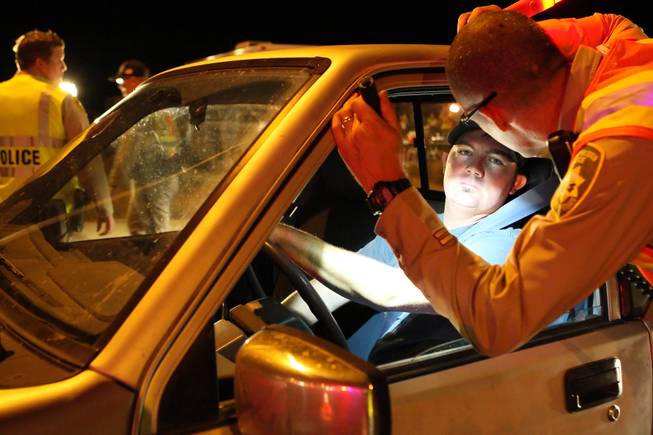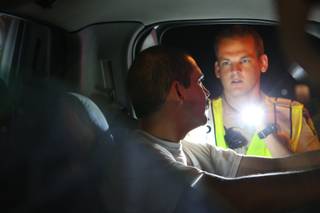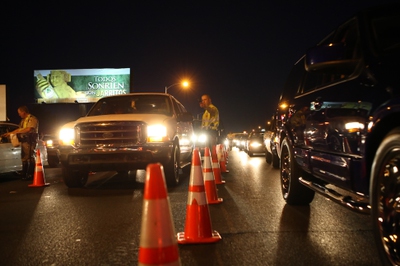
Mona Shield Payne/Special to the Sun
Metro Police Officer Bryan Bertges examines a driver’s eyes Friday, July 2, 2010, during vehicle stops at a DUI checkpoint on Nellis Boulevard south of East Lake Mead Boulevard.
Monday, July 5, 2010 | 2 a.m.
Reader poll
Sun Archives
As they have on most holiday weekends for several years now, Metro Police manned DUI checkpoints around the valley each night, forcing lines of drivers to stop and answer officers’ questions.
But whether the checkpoints are more effective at getting dangerously drunk drivers off the roads than roving patrols remains up for debate. Some argue that money spent on checkpoints — most of which comes from federal grants — would be better spent on more patrols.
One of the loudest critics of sobriety checkpoints is the American Beverage Institute, a restaurant trade association in Washington. It analyzed National Highway Traffic Safety Administration statistics from 2004 showing that each of the 11 states that at the time prohibited sobriety roadblocks experienced a decline in alcohol-related fatalities from the prior year, whereas nearly half of the states that conduct roadblocks saw an increase.
“You can take a whole bunch of police officers, pay them overtime and have them stand in one spot in hopes a drunken driver will come, or you can put them in patrol cars where they can look for dangerous drivers,” says Sarah Longwell, the institute’s managing director. “Roving patrols are far more effective at catching drunk drivers and speeders.”
Checkpoints, critics say, subject too many law-abiding motorists to unnecessary stops and police questioning. Some consider the checkpoints to be an unfair way of snagging drivers who have outstanding fines for traffic violations and other mundane offenses that don’t pose any immediate danger to the public.
Checkpoints have faced many legal challenges based on allegations that they can violate an individual’s protection against unreasonable search and seizure under the Fourth Amendment.
But the most recent U.S. Supreme Court rulings have favored law enforcement. DUI checkpoints are not only constitutional, but are also considered in compliance with the Fourth Amendment because it is in a state’s interest to prevent drunken driving and the roadblocks present only a brief inconvenience for motorists.
Longwell argues that police and anti-DUI groups favor checkpoints because “it’s all just a public-relations campaign. A lot of people see a checkpoint and they say, ‘Wow, they’re doing something about drunken driving.’ But the people who are most affected are the moderate social drinkers and the people who don’t drink at all.”
The high profile of checkpoints can also work against them, Longwell adds. In these days of cellular telephones, text messaging and Twitter, word can be relayed quickly back to nearby bars or parties of the checkpoint’s location, alerting drunken drivers to take a different route.
John Johansen, manager of the Nevada Office of Public Safety’s impaired driving program, maintains that “DUI checkpoints are extremely useful tools in raising awareness of driving under the influence. The advantage of a checkpoint is that it will get more press than a concentrated effort on roving traffic enforcement. With roving patrols you will get a few more people off the roads, but with checkpoints more people will learn about the dangers of DUI driving. That’s why you need to do both.”
That’s Metro’s opinion, too.
“By targeting a specific area we are able to stop a much larger number of vehicles,” says Lt. Christopher Ankeny, who runs Metro’s checkpoint program. Ankeny say deterring motorists from drinking while driving is the reason checkpoints are necessary.
“Metro traffic and patrol officers are out in the valley 24 hours a day, 365 days a year stopping drunk drivers on routine patrol. DUI checkpoints are just an additional resource.”
Metro, which made 308 DUI arrests at 19 checkpoints from 2008 through Memorial Day, operated four others this weekend. The checkpoints are usually at locations with high numbers of past DUI arrests and alcohol-related crashes.
But the DUI arrest rates can be minuscule in relation to the number of motorists stopped.
Over the Memorial Day weekend, Metro Police conducted five checkpoints and made 58 DUI arrests. Metro also issued 20 traffic citations and made three arrests for non-DUI charges. Police tallied the number of vehicles that passed through four of the checkpoints, where they stopped 14,954 vehicles and arrested 47 of the drivers on DUI charges. That translates to a DUI arrest rate of 0.31 percent.
Because the checkpoints tend to run from 7 p.m. to 3 a.m. and involve numerous officers, they can be relatively costly.
Many such roadblocks are funded by federal grants from NHTSA that are distributed through Nevada’s Traffic Safety Office to enforce alcohol-related laws. Metro can also spend this money on roving patrols and on saturation patrols targeting specific geographic areas. A separate source of Metro funding, Enforcing Underage Drinking Laws grants from the Justice Department, can be used only on checkpoints.
A microcosm of the debate over sobriety roadblocks is the reaction to a checkpoint Metro conducted late last month near Flamingo Road and Rainbow Boulevard. Of the 4,285 vehicles that passed through the roadblock over eight hours, the drivers of 16 were arrested on DUI charges. That’s an arrest rate of 0.37 percent, about the same as for the Memorial Day weekend checkpoints.
Tim Farrell's YouTube video at checkpoint
Las Vegas resident Tim Farrell, a wireless Internet engineer and civil libertarian who has tested Metro’s authority so he can make constitutional points, says those low DUI arrest rates indicate the checkpoints “are a waste of police resources.”
“If the same police resources dedicated to checkpoints instead went into stepped-up patrols and impaired-driver detection, the number of DUI arrests would increase, making our streets safer and putting more DUI offenders behind bars,” he argues.
Stop DUI co-founder and executive director Sandy Heverly, a leading Nevada advocate of sobriety checkpoints, sharply disagreed.
“That’s 16 potential killers they took off the road,” Heverly says of the 16 arrests. “God knows how many lives may have been saved.”
Farrell counters that the same kind of hypothetical reasoning could be used to say the checkpoints actually cost the lives of whatever alcohol-related fatalities occurred elsewhere during that time period because the officers at the checkpoints otherwise could have stopped those drunken drivers before they killed themselves or others.



Join the Discussion:
Check this out for a full explanation of our conversion to the LiveFyre commenting system and instructions on how to sign up for an account.
Full comments policy